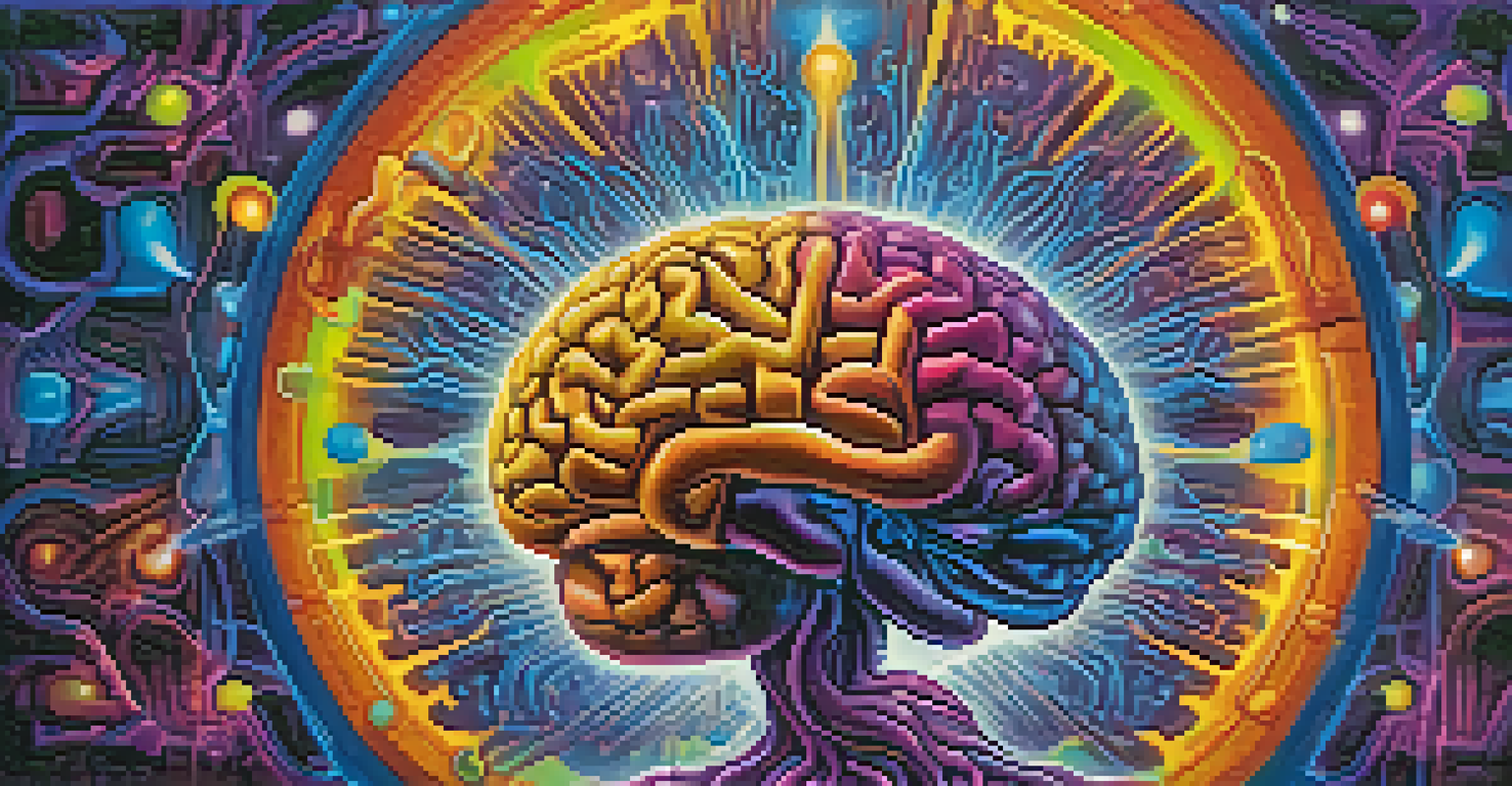Neuroethics: The Intersection of Psychedelics and Ethics

Understanding Neuroethics: A Primer
Neuroethics is a fascinating field that examines the ethical implications of neuroscience and neurotechnology. It delves into how our understanding of the brain influences our views on moral responsibility, mental health, and even free will. At its core, neuroethics asks us to consider how advancements in brain science impact our society and individual lives.
The mind is everything. What you think you become.
This field becomes particularly intriguing when we introduce psychedelics, substances that alter perception, mood, and cognition. As research into psychedelics like psilocybin and LSD expands, so do the ethical questions surrounding their therapeutic use. This intersection of neuroscience and ethics invites us to rethink how we view mental health treatment and the potential for these substances to help those in need.
For instance, if a psychedelic experience can alleviate severe depression, what responsibilities do researchers and practitioners have in administering these treatments? The conversations sparked by neuroethics encourage us to explore the balance between scientific progress and moral considerations.
The Rise of Psychedelic Research
In recent years, there's been a resurgence of interest in psychedelic research, reflecting a shift in societal attitudes. Studies have shown that psychedelics can have profound effects on mental health conditions, such as PTSD and anxiety. This revival has led to a growing acceptance of these substances as potential therapeutic agents, rather than just recreational drugs.

However, this newfound interest raises important ethical questions about safety, consent, and the potential for misuse. For example, as psychedelics become more accessible, how do we ensure that individuals use them responsibly and with proper guidance? The responsibility lies not only with researchers but also with healthcare providers and society as a whole.
Neuroethics Explores Brain Science Impact
Neuroethics examines how advancements in neuroscience and neurotechnology affect our understanding of moral responsibility, mental health, and free will.
Moreover, the commercialization of psychedelics poses another layer of complexity. As companies seek to capitalize on their therapeutic potential, we must consider how profit motives might influence research outcomes and patient care. This dynamic emphasizes the need for robust ethical frameworks to guide the development and distribution of psychedelic therapies.
Ethical Considerations in Psychedelic Therapy
Psychedelic therapy often involves deep, transformative experiences that can significantly impact a person's psyche. With such power comes the ethical obligation to safeguard the well-being of participants. Therapists must navigate the fine line between facilitating healing and ensuring that patients are not harmed by these intense experiences.
Psychedelics are a way of having a conversation with the unconscious mind.
Informed consent is another crucial aspect of psychedelic therapy. Patients need to fully understand what they are consenting to, including the potential risks and benefits of using psychedelics. This is especially vital given the subjective nature of psychedelic experiences, which can vary widely from person to person.
Additionally, the setting in which these therapies occur plays a pivotal role in their effectiveness. Ethical considerations must extend to creating safe, supportive environments where individuals can explore their consciousness without fear or judgment. Acknowledging these nuances is essential for the responsible integration of psychedelics into therapeutic practices.
Cultural Context and Historical Perspectives
Understanding the ethical implications of psychedelics also requires a look at their cultural context and historical use. Many indigenous cultures have utilized these substances for centuries in spiritual and healing rituals. This rich history highlights the need to respect traditional practices while considering modern therapeutic applications.
However, the appropriation of these practices raises ethical concerns about ownership and respect. As Western researchers and practitioners adopt these methods, it's essential to acknowledge and honor the cultures that have long utilized psychedelics. This respect can foster collaboration and mutual benefit, rather than exploitation.
Psychedelics Raise Ethical Questions
The therapeutic use of psychedelics prompts significant ethical considerations regarding safety, consent, and the potential for misuse in treatment.
By weaving together historical perspectives with contemporary research, we can create a more holistic understanding of psychedelics and their potential. This approach encourages ethical dialogue that values both scientific inquiry and cultural heritage, ultimately enriching the conversation around neuroethics.
Psychedelics and the Concept of Free Will
The question of free will is another intriguing aspect of neuroethics as it relates to psychedelics. When individuals undergo psychedelic experiences, their perceptions and decision-making processes can be profoundly altered. This raises questions about the extent to which they are exercising free will during these altered states.
For example, if a person feels compelled to confront deep-seated trauma or change their perspective during a psychedelic trip, are they truly making an autonomous choice? Or are they merely responding to the effects of the substance? This dilemma highlights the need for careful consideration of autonomy in the context of psychedelic therapy.
Addressing these questions is crucial for developing ethical guidelines that respect individual agency while recognizing the transformative potential of psychedelics. Striking a balance between facilitating meaningful experiences and honoring free will is a central challenge in the neuroethical landscape.
The Role of Regulation in Psychedelic Research
As interest in psychedelic research grows, so does the need for effective regulation. Ensuring that these substances are studied and used safely requires a comprehensive framework that addresses various ethical concerns. Regulatory bodies play a vital role in overseeing research practices, therapeutic applications, and the commercialization of psychedelics.
However, the regulatory landscape can be complex and slow to adapt to new scientific findings. Striking a balance between protecting public safety and fostering innovation is a delicate task. This challenge requires ongoing dialogue between researchers, ethicists, and policymakers to create regulations that are both effective and flexible.
Regulation is Crucial for Safety
Effective regulation is essential to ensure the safe study and use of psychedelics, balancing public safety with the need for innovation in therapeutic applications.
Moreover, as we navigate this evolving landscape, it's essential to include diverse voices in the conversation. Engaging with various stakeholders, including patients, indigenous communities, and mental health advocates, can lead to more comprehensive and equitable regulatory approaches. This inclusivity will ultimately enhance our understanding of the ethical dimensions of psychedelics.
Future Directions in Neuroethics and Psychedelics
Looking ahead, the intersection of neuroethics and psychedelics presents exciting opportunities for exploration. As research continues to unveil the therapeutic potential of these substances, we must remain vigilant in addressing the ethical implications. This includes ongoing discussions about consent, safety, and the cultural context of psychedelic use.
Furthermore, as psychedelics gain mainstream acceptance, there will be a growing need for education and awareness. Educating both practitioners and the public about the ethical dimensions of psychedelics is crucial for fostering responsible use and informed decision-making. This knowledge can empower individuals to make choices that align with their values and well-being.

Ultimately, the future of neuroethics and psychedelics will rely on collaboration and open dialogue. By bringing together diverse perspectives and expertise, we can navigate the complexities of this field and ensure that the integration of psychedelics into society is both ethical and beneficial for all.